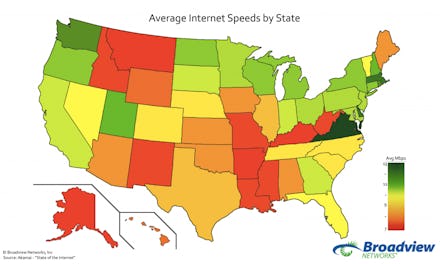One Statistic Shows Just How Terrible America's Internet Access Is

The fastest average Internet speed in America is half the speed of South Korea's.
The news: According to a review commissioned by Broadview Networks that measured the average Internet speed in each state by cloud services provider Akamai (seen above), the results aren't very pretty. While the northeast and northwest have speedy Internet relative to the rest of the country, the Washington Post's Niraj Chokshi puts this in stark perspective:
But even the fastest speed in the nation, Virginia's 13.7 average megabits per second, is just more than half of South Korea's average 23.6 mbps. The U.S. average is 10.5 mbps. Alaska had the slowest Internet speed at 7.0 mbps.
South Korea does have abnormally fast Internet. But according to Akamai's data, the U.S. is also behind Hong Kong, Japan, the Czech Republic, Finland, Ireland, the Netherlands, Sweden and Switzerland. It doesn't even crack the top 10 fastest average connection speeds in the world:
Source: Akamai
It doesn't end there: In terms of bandwidth capacity, the U.S. fares even worse. A World Economic Forum report from the end of last year found that America ranks 35th in broadband capacity, 20th in population using the Internet and 17th for number of broadband connections per 100 people.
What's more, Americans pay some of the highest prices in the world for sluggish, overburdened connections, while most major ISPs run much slower than advertised.
For a nation that boasts a thriving high-tech startup scene and most of the world's richest tech companies, the U.S. offers up pretty mediocre Internet to residential customers.
Who you should blame: Internet service providers. American Internet providers' monopoly position between major content providers and actual Internet users has empowered them to squeeze the entire Internet looking for loose change. Upgrading networks is expensive and ISPs that face no meaningful competition (30% of Americans don't even have a choice of provider) have no incentive to do it.
Instead, they squat. Level 3 Communications' Michael Mooney argues that certain ISPs (cough, Verizon) refuse to expand capacity as demand grows unless content providers pay for it, while company VP Mark Taylor demonstrated that most American ISPs are participating in this cynical shakedown.
Ultimately, because it's lucrative to sit there doing nothing, American ISPs won't invest in the infrastructure that would actually improve service. That also explains why they have the worst customer service approval ratings of any industry, behind big banks, airlines and insurance companies.